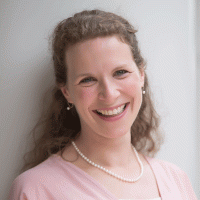For NC breast cancer patients, insurance type and distance to care can be barriers to breast reconstruction
July 28, 2016
Women were less likely to have breast reconstruction surgery after mastectomy if they had Medicaid or Medicare rather than private insurance or if they lived 10 or more miles from a plastic surgeon’s office, a University of North Carolina Lineberger Comprehensive Cancer Center study has found.
Anne Marie Meyer, PhD, research assistant professor of epidemiology at UNC Gillings School of Global Public Health and UNC Lineberger member, is a co-author of the study.
Researchers said the findings, published in the August issue of Plastic and Reconstructive Surgery, highlight additional barriers to breast reconstruction in addition to other obstacles that have been identified, including race, socio-economic class and age. The new data are concerning, researchers said, as the procedure can help with self-esteem, sexuality and body image after cancer treatment.
“We know that breast cancer affects not only the physical well-being of the patient, but also her psychosocial well-being, and we know that breast reconstruction can help address those issues,” said the study’s first author Michelle Roughton, MD, assistant professor of surgery and program director for the UNC School of Medicine’s Division of Plastic and Reconstructive Surgery. “These findings highlight the fact that there are more barriers to breast reconstruction access than we previously recognized.”
In the study, researchers analyzed insurance claims data for 5,381 women in North Carolina who were diagnosed with breast cancer between 2003 and 2006. The study included women with Medicaid, Medicare or private health insurance plans, who had a mastectomy within six months of diagnosis and who continued to maintain their insurance coverage for at least two years after the procedure. Twenty percent of women included in the study chose breast reconstruction.
The study drew upon UNC Lineberger’s Integrated Cancer Information Surveillance System (ICISS), a research tool that links population and clinical data to health claims data for about 5.5 million people insured by Medicare, Medicaid or private insurance policies.
In the raw, unadjusted data, researchers found that 56 percent of women with private insurance received breast reconstruction, compared with 10 percent of women with Medicare and 11 percent of those with Medicaid. After adjusting for related patient factors such as age or stage of disease, they found that Medicare recipients were 42 percent less likely to receive breast reconstruction than were women with private insurance. Women with Medicaid coverage were 76 percent less likely.
“Even when we controlled for age, the type of insurance patients had was still an independent predictor of whether patients received breast reconstruction,” Roughton said.
By federal law, group health plans that pay for mastectomy also must cover breast prosthetics and reconstructive procedures. Medicare does cover the procedure, but Medicaid coverage can vary by state. Roughton said one factor affecting access to reconstruction may be that not all surgeons accept all types of insurance for the procedure.
“As doctors working for the state’s flagship cancer hospital, we aim to provide breast reconstruction to every woman who desires it, despite distance and payer,” Roughton said.
Distance to the nearest plastic surgeon was also predictive of whether women underwent reconstruction. The study found that women living 20 or more miles away were 27 percent less likely to receive breast reconstruction, compared to women living within 10 miles of a surgeon. Women living 10 to 20 miles away from the nearest surgeon were 22 percent less likely.
The study also found that minority women had 50 percent lower odds of receiving reconstruction, compared to non-Hispanic whites. Consistent with previous studies, researchers also found that increasing age at diagnosis, advanced cancer stage and radiation treatment also decreased the likelihood of reconstruction.
Roughton said she has tried to overcome distance obstacles for her patients by using telemedicine for initial consultations and by using text and email to help assess patients after the operation.
In addition to Roughton and Meyer, study co-authors include Paul DiEgidio, MD, of the UNC School of Medicine; Lei Zhou, MSPH, of UNC Lineberger; and Karyn Stitzenberg, MD, MPH, of the UNC School of Medicine.
The study was supported by the University Cancer Research Fund.
This news originally was published by UNC Lineberger Comprehensive Cancer Center.
Share
Gillings School of Global Public Health contact: David Pesci, director of communications, (919) 962-2600 or dpesci@unc.edu

